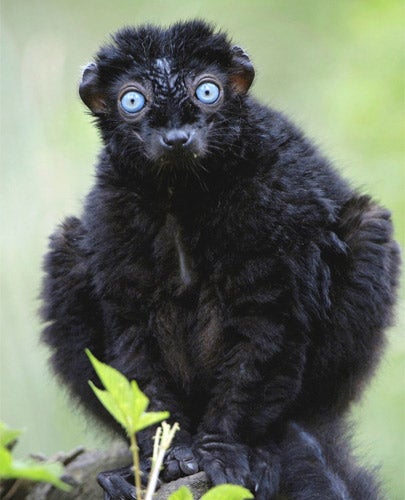Ol' blue eyes faces the final curtain

Ever seen such bright blue eyes? The blue-eyed black lemur of Madagascar is something of a celebrity. "We always say they are the Hollywood stars of the primates," said Christoph Schwitzer, who studies the animals in Madagascar's north-western forests. "Stunningly beautiful, but a bit stupid."
The lemurs are accustomed to researchers in the newly created Sahamalaza national park, and Dr Schwitzer and his colleagues have built up a clear picture of the life of Eulemur flavifrons – and also of the threats to the species, which are enormous.
"The main threat is habitat degradation through slash- and-burn subsistence agriculture by the local human population," Dr Schwitzer said. "People burn down a chunk of forest, plant their rice, and after about three years the soil is infertile, so they just go to another place, burn down another chunk of forest, and do the same again. With the human population explosion, this simply ceases to be sustainable, and Madagascar has a population growth rate of 3 per cent a year."
Outside the national park, he said, there were 500 lemur traps per square kilometre of forest. "It's huge. There'll be no lemurs left in five years if that goes on." The local tribe did not eat lemurs, he said, but people from other parts of the island were moving in, and they did.
The entire blue-eyed black lemur population is now no more than 2,500 animals at the highest, and may number no more than 250. But Dr Schwitzer said conservation efforts were not hopeless. "I think we are making a difference on the ground. We need to do more reforestation and work with local people and give them incentives to try and help us preserve the wildlife."
Join our commenting forum
Join thought-provoking conversations, follow other Independent readers and see their replies
Comments
Bookmark popover
Removed from bookmarks